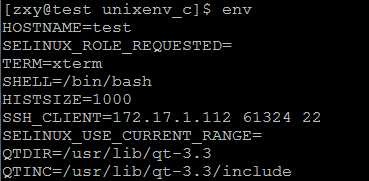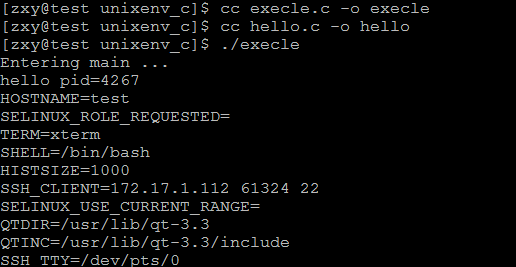linux系統編程之進程(五):exec系列函數(execl,execlp,execle,execv,execvp)使用
- 本節目標:
- exec替換進程映像
- exec關聯函數組(execl、execlp、execle、execv、execvp)
##一,exec替換進程映像 在進程的創建上Unix採用了一個獨特的方法,它將進程創建與加載一個新進程映象分離。這樣的好處是有更多的餘地對兩種操作進行管理。
當我們創建了一個進程之後,通常將子進程替換成新的進程映象,這可以用exec系列的函數來進行。當然,exec系列的函數也可以將當前進程替換掉。
例如:在shell命令行執行ps命令,實際上是shell進程調用fork複製一個新的子進程,在利用exec系統調用將新產生的子進程完全替換成ps進程。
##二,exec系列函數(execl、execlp、execle、execv、execvp)
包含頭文件<unistd.h>
功能:
用exec函數可以把當前進程替換為一個新進程,且新進程與原進程有相同的PID。exec名下是由多個關聯函數組成的一個完整系列,
頭文件<unistd.h>
extern char **environ;
原型:
int execl(const char *path, const char *arg, ...);
int execlp(const char *file, const char *arg, ...);
int execle(const char *path, const char *arg, ..., char * const envp[]);
int execv(const char *path, char *const argv[]);
int execvp(const char *file, char *const argv[]);
參數:
path參數表示你要啟動程序的名稱包括路徑名
arg參數表示啟動程序所帶的參數,一般第一個參數為要執行命令名,不是帶路徑且arg必須以NULL結束
返回值:成功返回0,失敗返回-1
注:上述exec系列函數底層都是通過execve系統調用實現:
#include <unistd.h>
int execve(const char *filename, char *const argv[],char *const envp[]);
DESCRIPTION:
execve() executes the program pointed to by filename. filename must be
either a binary executable, or a script starting with a line of the form
以上exec系列函數區別:
1,帶l 的exec函數:execl,execlp,execle,表示後邊的參數以可變參數的形式給出且都以一個空指針結束。
示例:
#include <stdio.h>
#include <stdlib.h>
#include <unistd.h>
int main(void)
{
printf("entering main process---\n");
execl("/bin/ls","ls","-l",NULL);
printf("exiting main process ----\n");
return 0;
}
利用execl將當前進程main替換掉,所有最後那條打印語句不會輸出
2,帶 p 的exec函數:execlp,execvp,表示第一個參數path不用輸入完整路徑,只有給出命令名即可,它會在環境變量PATH當中查找命令
示例:
當不帶p但沒給出完整路徑時:
#include <stdio.h>
#include <stdlib.h>
#include <unistd.h>
int main(void)
{
printf("entering main process---\n");
execl("/bin/ls","ls","-l",NULL);
printf("exiting main process ----\n");
return 0;
}
結果:
結果顯示找不到,所有替換不成功,main進程繼續執行
現在帶p:
替換成功
3,不帶 l 的exec函數:execv,execvp表示命令所需的參數以char *arg[]形式給出且arg最後一個元素必須
是NULL
示例:
#include <stdio.h>
#include <stdlib.h>
#include <unistd.h>
int main(void)
{
printf("entering main process---\n");
int ret;
char *argv[] = {"ls","-l",NULL};
ret = execvp("ls",argv);
if(ret == -1)
perror("execl error");
printf("exiting main process ----\n");
return 0;
}
結果:
進程替換成功
4,帶 e 的exec函數:execle表示,將環境變量傳遞給需要替換的進程
從上述的函數原型中我們發現:
extern char **environ;
此處的environ是一個指針數組,它當中的每一個指針指向的char為“XXX=XXX”
environ保存環境信息的數據可以env命令查看:
它由shell進程傳遞給當前進程,再由當前進程傳遞給替換的新進程
示例:execle.c
#include <stdio.h>
#include <stdlib.h>
#include <unistd.h>
int main(int argc, char *argv[])
{
//char * const envp[] = {"AA=11", "BB=22", NULL};
printf("Entering main ...\n");
int ret;
ret =execl("./hello", "hello", NULL);
//execle("./hello", "hello", NULL, envp);
if(ret == -1)
perror("execl error");
printf("Exiting main ...\n");
return 0;
}
- hello.c
#include <unistd.h>
#include <stdio.h>
extern char** environ;
int main(void)
{
printf("hello pid=%d\n", getpid());
int i;
for (i=0; environ[i]!=NULL; ++i)
{
printf("%s\n", environ[i]);
}
return 0;
}
結果:
可知原進程確實將環境變量信息傳遞給了新進程
那麼現在我們可以利用execle函數自己給的需要傳遞的環境變量信息:
示例程序:execle.c
#include <stdio.h>
#include <stdlib.h>
#include <unistd.h>
int main(int argc, char *argv[])
{
char * const envp[] = {"AA=11", "BB=22", NULL};
printf("Entering main ...\n");
int ret;
//ret =execl("./hello", "hello", NULL);
ret =execle("./hello", "hello", NULL, envp);
if(ret == -1)
perror("execl error");
printf("Exiting main ...\n");
return 0;
}
- hello.c
#include <unistd.h>
#include <stdio.h>
extern char** environ;
int main(void)
{
printf("hello pid=%d\n", getpid());
int i;
for (i=0; environ[i]!=NULL; ++i)
{
printf("%s\n", environ[i]);
}
return 0;
}
結果:
確實將給定的環境變量傳遞過來了
三,fcntl()函數中的FD_CLOEXEC標識在exec系列函數中的作用
#include <unistd.h>
#include <fcntl.h>
int fcntl(int fd, int cmd, ... /* arg */ );
File descriptor flags
The following commands manipulate the flags associated with a file
descriptor. Currently, only one such flag is defined: FD_CLOEXEC, the
close-on-exec flag. If the FD_CLOEXEC bit is 0, the file descriptor
will remain open across an execve(2), otherwise it will be closed.
//如果FD_CLOEXEC標識位為0,則通過execve調用後fd依然是打開的,否則為關閉的
F_GETFD (void)
Read the file descriptor flags; arg is ignored.
F_SETFD (long)
Set the file descriptor flags to the value specified by arg.
如:fcntl(fd, F_SETFD, FD_CLOEXEC);
測試示例:
#include <stdio.h>
#include <stdlib.h>
#include <unistd.h>
#include <fcntl.h>
int main(int argc, char *argv[])
{
printf("Entering main ...\n");
int ret = fcntl(1, F_SETFD, FD_CLOEXEC);
if (ret == -1)
perror("fcntl error");
int val;
val =execlp("ls", "ls","-l", NULL);
if(val == -1)
perror("execl error");
printf("Exiting main ...\n");
return 0;
}
結果:
1關閉(標準輸出關閉)ls -l無法將結果顯示在標準輸出







